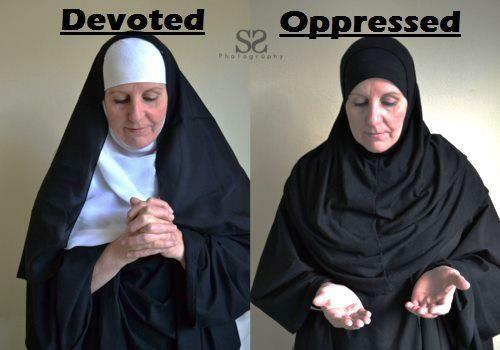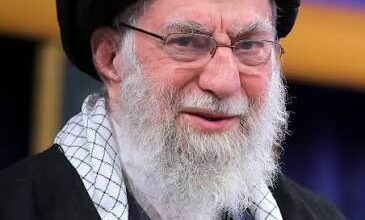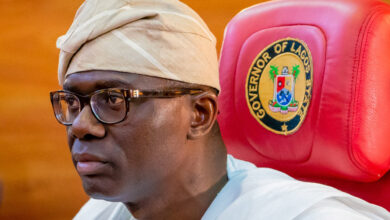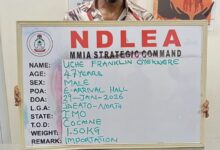Of the Hijabites and the nuns

By Muhammad Ajah
There is no much difference between the head cover used by the Muslim women and the Christian nuns. This piece of cloth, it is unarguable, gives the women beautiful outlook and prevents them from social harassment. This is the simple truth, accept it or reject it! I have witnessed, read and heard of situations where women who cover their heads are admired by their fellows wherever they are. The only difference that I have constantly observed is that majority of the Christians prefer to make caricature of Muslim women who wear the head covers. In addition, the Christian women do not copy the model set for them by Mary, the mother of Jesus Christ who they believe is the source their salvation.
Above all, those who don the head cover – veil or scarf – possess spiritual protection that no human can easily explain. I have read and heard of situations where women with their heads covered in adherence to the divine instruction of their religions were mysteriously secured from physical injuries and spiritual attacks. There have been cases when armed robbers terrorized passengers on the roads but would protect the Muslim women in Hijab and the nuns. There are also cases when spiritual consultants rejected Muslim females for sacrifices.
The story of a sage in defense of women covering themselves is interesting. The sage told his questioner to pick two candies. He then told the questioner to throw one of them into the dust and pick it up; then he asked the questioner to choose between the dirty candy and the one yet covered. The questioner quickly chose the covered one. That was the conviction that, no matter the perceived detestation for women who cover their heads, no sane human would prefer dirty things to clean things. Medically and hygienically, covering of consumables and fragile things are recommended.
Naturally, women are fragile and their bodies are prone to attraction and assault by men. This is why the women who prefer to move about with nudity in the name of civilization meet different kinds of harassment. The rising level of raping in African societies, at least of the adults, can be linked to the costumes which women wear. Some of the victims wrap themselves, dress half naked or even put on underwear to seduce or attract suitors, though men are becoming wiser these days. No normal Muslim woman dresses abnormal. But a lot of Christian women do dress abnormal for the mere reason of mimicking the Western world which, apparently, has code of dress for different occasions. Nowadays, it is ladies who seduce men with their atypical dresses and yet cry wolf when hassled.
If the Christians do really believe in Mary, why do they refuse to cover their heads? Yet, the nuns amongst them dress like Mary. Again, the height of hypocrisy is displayed whenever they want to pray. While praying, some of them would place a piece of paper, a handkerchief or part of their wrapper on the head. I often laugh silently when I see them do this in public places especially in buses. This attitude is observable even in churches. But on a serious note, why should Christians derive joy in fighting Muslim women who wear veils like Mary, the mother of Jesus? In Nigeria, all government agencies which require the capturing of the photo of the citizen allegedly treat the Muslim women with disdain.
The latest of these series of ill-treatment and denial of the fundamental rights of Muslim women in Nigeria was Amasa Firdaus Abdulsalam who was not permitted by the Body of Benchers to enter the International Conference Centre on December 12 where the call to bar is usually held. Firdaus wore her new gown but insisted on wearing the wig on top of her Hijab. It was a violation of her right to freedom of religion as protected by Section 38 of the 1999 Constitution. In an interview, she maintained her convictions to set a precedent for Hijab-wearing Muslims during the call-to-bar ceremony. This singular action has triggered controversies amongst the local and international law bodies and human rights activists and organizations.
We are worried that this matter is gradually degenerating into another religious confrontation between Muslims and Christians of Nigeria. And we ask: Haven’t we had enough of these religious wrangling?
The Nigerian Bar Association (NBA) was quick to vow to look into the matter. The House of Representatives mandated a joint committee on Justice and Federal Judiciary to investigate the controversy due to a motion of urgent public importance raised by Honouable Danburan Nuhu from Kano, alleging that the rights of Firdaus had been violated. The committee on justice is chaired by Honouable Razak Atunwa from Kwara while federal judiciary is chaired by Honouable Aminu Shagari from Sokoto.
The scheduled public hearing of the committee on the matter on February 6, after memoranda from various individuals and groups had been received, was postponed indefinitely. But a Federal High Court, Abuja approached by a coalition of Lawyers for the Preservation of Legal Practitioners’ Ethics, seeking to stop the House of Representatives from the a public hearing has made progress. Mr. Sunday Akanni, counsel to the applicants, had told the court that his clients were against the move on the grounds that it was unconstitutional as only the court that can look into such matters. The court on February 28 granted the applicants’ submission and ordered that the public hearing be put on hold, pending the determination of the substitutive suit. Justice Anwuli Chikere adjourned the matter to April 24 for hearing.
Notwithstanding all the legal and legislative tussles, there is high demand for immediate ‘call to bar’ for Firdaus. There is the call for a judicial inquiry into the circumstances surrounding the molestation of Muslim students who were forced to remove their Hijab on the same day. There is the demand for the identification and adequate disciplinary measures against a Law School female lecturer who was said to have stepped on the Hijab of Firdaus, rubbing it on the floor and kicking it around. This kind of attitude from a lecturer is unbelievable and condemnable. There is the demand for a review of the code of dressing in the Nigerian Law School to accommodate the diversity of religious beliefs in Nigeria. Also of importance, civil society organizations insist on a review of the dress code in all professions where uniforms are used such that female Muslims in such professions can use suitable Hijab along with the uniform as obtainable in some developed nations. These are parts of summaries of the memoranda like that of the Muslim Rights Concern (MURIC) entitled “Memorandum in Respect of Call to Bar Case in the School of Law”.
A coalition under the auspices of the Nigerian Supreme Council for Islamic Affairs (NSCIA) in a communiqué signed by Mallam Isa Okonkwo criticized the postponement of the public hearing and cautioned the NASS, as representatives of the people, to ensure level playing ground to all stakeholders involved in the issue in the spirit of equity, fairness and justice.
As for MURIC, Muslim women who work in uniformed bodies in Nigeria such as the army, police, traffic agencies, uniformed voluntary groups, hospitals, the National Youth Service Corps (NYSC), students of primary and secondary schools, amongst others, use uniforms designed by the Christian colonialists. These uniforms, MURIC postulated, should have been reviewed after independence because they only suit Christians and Muslim women are uncomfortable in them. Some of them, the group said, constitute breaches to Islamic dress code and offend the sensibility of Muslim women who are compelled to wear the uniforms regardless of their inner feeling of resentment.
On a general note, Hijab is an international dress code that should be allowed in Nigeria. The controversies it has created in the states of the Southwest geopolitical zone of the country should have sounded enough warning that Christians should allow Muslim women be. Hijab is a religious dress that should not be undermined by non-Muslims. It is celebrated every year on February 1. So, the Firdausgate gave the celebration this year a hot marking.
Tagged the World Hijab Day (WHD), Nigerian Muslim Women used the occasion to decry discrimination against them at their work places. A host of Muslim women organizations in Nigeria made the day a memorable one. The women led by the Hijab Right Advocacy Initiative leader, Mutiat Orolu, told the press in Lagos that wearing of Hijab is not the culture of Arabs as erroneously held by some people or a fashion accessory that the Muslim woman may discard at will. “It is a religious duty and an obligation on every Muslim woman in the observance of her faith.” This right to believe in and practice one‘s chosen faith, she opined, is an inalienable right of every human being, as entrenched in the Constitution of the Federal Republic of Nigeria 1999 (as amended)”.
However, caution, tolerance and understanding from non-Muslims are required in this case. There is no reason to detest Muslim women adorning Hijab because it is a manifestation of her religious rights. Muslim ladies should not be subjected to ridicules, intimidation, harassment and even beating by intolerant colleagues, bosses and neighbours because they wear Hijab. The support of the Nigerian Muslim Ummah for Miss Firdaus Amasa and her colleague Miss Aisha Zubair is unwavering. The Muslim Media Practitioners of Nigeria (MMPN) has called for justice. Let this matter be quickly resolved to save further division amongst the Muslim and Christian citizens.









